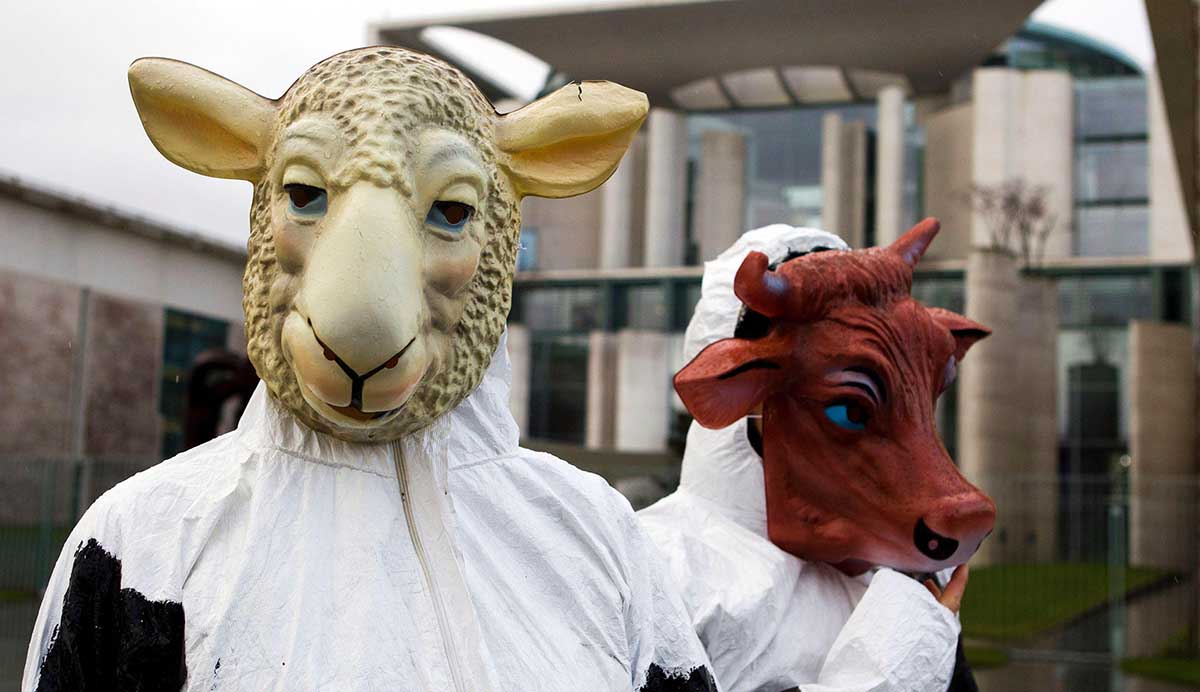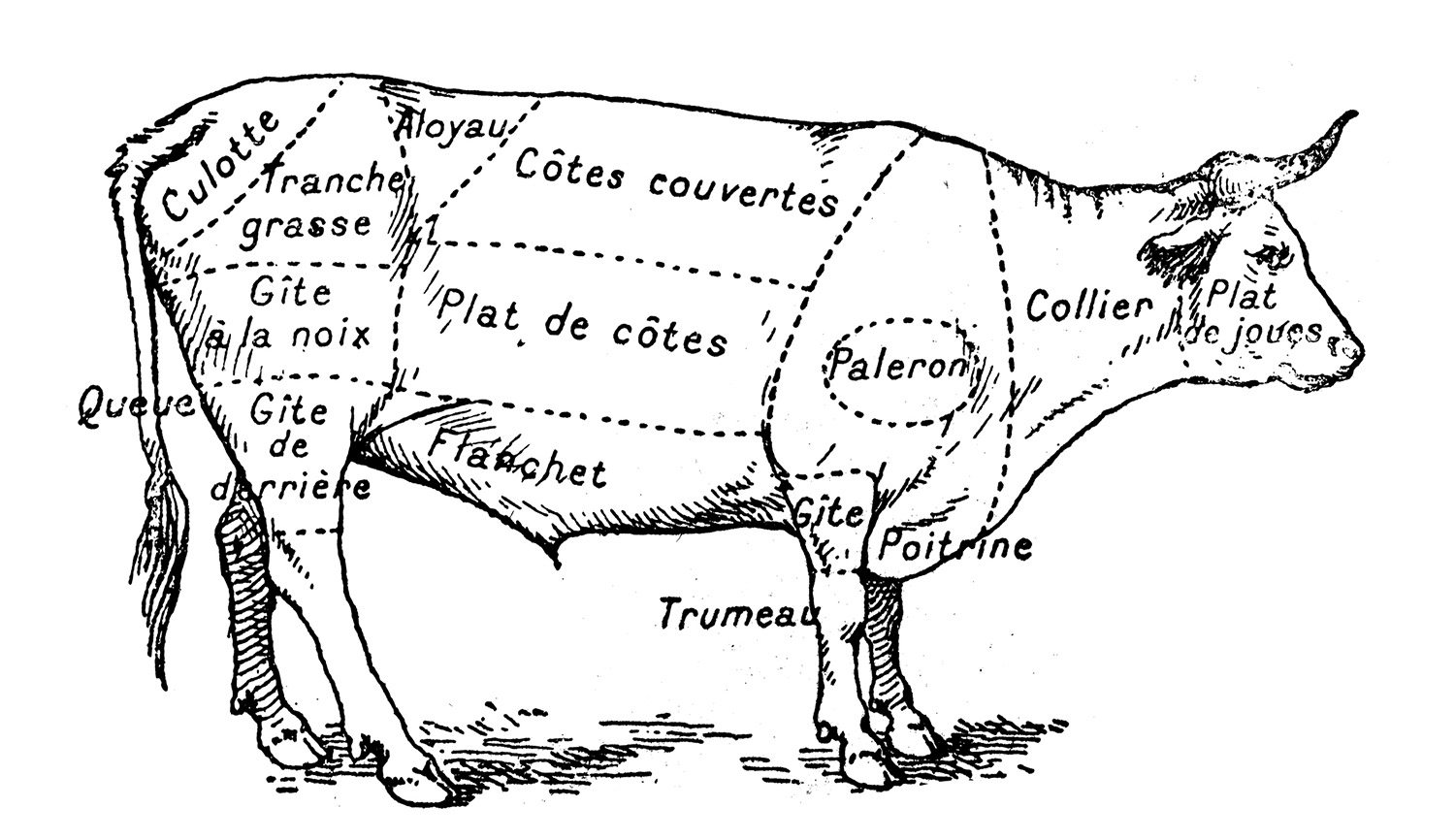Like many people who have browsed online videos about the reality of the meat industry, I was shocked, disheartened, and disoriented by what I saw. The vile treatment inflicted on animals in slaughterhouses, not just during the slaughter but before and after, along with the flouting of basic rules of decency and hygiene, grieved my heart.
Yet there is no doubt in my mind that, as Eric Mechoulan contends in his thought-provoking essay, the arguments being made in Europe against ritual slaughter are not directed at these very real problems. The effort to ban ritual slaughter, whether of the kosher or the halal variety, is based on the preposterous belief that inflicting death can ever be painless or clean. In truth, European societies prefer to accuse Jews and Muslims of animal cruelty than to look to their own failures—failures that, to be fair, the religious meat market is guilty of exploiting.
Killing an animal is a gruesome, heartbreaking act in itself, regardless of the method. And as Mechoulan makes clear, stunning—the favored technique for making slaughter more humane, which violates the laws of kashrut—in no way solves the problem, and introduces cruelties of its own.
While scientific research on animal suffering has been inconclusive, the facts show that the meat industry’s real problem isn’t ritual slaughter, but a general disregard for basic moral and sanitary rules that can be found in ritual as well as in mainstream slaughterhouses. If ritual slaughter has attracted scrutiny, it is because unscrupulous businessmen have instrumentalized the European legal exceptions that allow it so that they can make slaughtering animals quicker and, therefore, cheaper.
Thus, Mechoulan’s argument that anti-Semitism explains, at least partially, the focus on shechita makes much sense, but needs some qualification: more than Europe’s problematic relationship to Islam or Judaism, the bans on ritual slaughter point to a lack of a genuine understanding of the meaning of religion in society and of what freedom of religion should entail.
To understand why this is so, it’s necessary to examine the highly variegated ideological sources of the movement to outlaw ritual slaughter in Europe. In France, for instance, opposition to the practice may be the sole point of agreement between the nationalistic Marine Le Pen on the far right and the vegetarian animal-rights advocate Aymeric Caron on the far left. There are at least four different categories of anti-ritual slaughter activists in Europe: nationalists, animal-rights activists, anti-religion secularists, and consumer-rights defenders.
The movement to ban ritual slaughter has thus created a broad right-to-left consensus among people who otherwise agree on nothing. More than actual anti-Semitism, what brings together this eclectic group of intellectuals, politicians, and activists is their common and shallow grasp of religion and their corresponding insensitivity to protecting religious freedom.
Indeed, when we look at their rhetoric, a common thread is the assumption that religion is not the foundation of human life and dignity but rather a replaceable good that can, and should, take a backseat to more important concerns. Take the aforementioned Aymeric Caron, one of France’s most vocal activists against ritual slaughter: citing Arthur Schopenhauer, Caron understands biblical religion to be the source of man’s violent domination of nature and animals. He sees anyone who denies humans are nothing more than another species of animal as the equivalent of those 17th-century religious fanatics who denied that the earth is round.
At the opposite end of the political spectrum, Marine Le Pen, leader of the far-right National Rally, opposes ritual slaughter on grounds of laïcité—a uniquely French version of secularism that involves the removal of religion from public life. (Le Pen’s strict construction of the laïcité somehow makes an exception for Catholicism.)
Finally, for consumer advocates, religion is at best a matter of individual preference, at worst a product of a backward state of mind, and should not under any circumstance trump other concerns. The common denominator of these cases is a failure to treat religion with any seriousness—if not contempt for religion altogether.
At the same time as these attitudes to religion are gaining purchase not just in France but in Europe more broadly, the European Union courts’ commitment to protecting freedom of religion has been deteriorating.
Religious liberty is protected by the EU’s founding texts. In particular, the 1950 European Convention provides broad guarantees granting special protection not only to religious belief but also to religious practice, in its collective as well as individual dimension. Thus Article 9 states: “Everyone has the right to freedom of thought, conscience, and religion; this right includes freedom to change his religion or belief and freedom, either alone or in community with others, and in public or private, to manifest his religion or belief in worship, teaching, practice, and observance.”
In the foundational 1993 Kokkinakis case, the European Court for Human Rights (ECHR) supported a robust interpretation of religious freedom against the Greek state, which had tried to limit proselytizing activities on its territory. But some 25 years later, in its December 2020 judgment on ritual slaughter, the European Court of Justice (EUCJ) found that the Belgian regions of Flanders and Wallonia could prohibit ritual slaughter without prior stunning, and thus that religious freedom could be legitimately limited. What happened?
It is true that European law has always recognized limits on the protection of religious practices. The above-quoted Article 9 of the European Charter clarifies that “Freedom to manifest one’s religion or beliefs shall be subject only to such limitations as are prescribed by law and are necessary in a democratic society in the interests of public safety, for the protection of public order, health, or morals, or for the protection of the rights and freedoms of others.” Thus, in 1986, the ECHR found that the ruling of the British courts forbidding members of a Druidic group to perform a ceremony at Stonehenge during the summer solstice was justified on the grounds of public order. (The ceremony had attracted many curious onlookers in the past and caused disruptions and damage to the historical monument.)
But the 2020 judgment in the case of the ritual slaughter ban in Wallonia and Flanders constituted a radical departure from such limited carve-outs in suggesting that religious freedom can be balanced with other “values” of society—here, animal welfare. Indeed, it is interesting to note that in the case of ritual slaughter, none of the boxes justifying “legitimate interference” mentioned in Article 9 have been ticked. Rather, for the first time, the protection of religion was not seen as a fundamental right that only superior interests can supersede, but as a value to be balanced against other values.
The 2020 decision was not a watershed but the culmination of a slow evolution of European jurisprudence on religious freedom since the beginning of the 2000s, that legal scholars like Jeroen Temperman of the University of Rotterdam have interpreted as a gradual degradation of the protection of religious freedom in Europe. In particular, Professor Temperman and his colleagues have criticized the ECHR’s introduction of a new principle, the “margin of appreciation.” This principle leaves it to the state to determine whether a limitation on freedom of religion is necessary, thus endorsing a reality in which the protection of religious freedom is a matter of a particular government’s political and cultural preferences.
This doctrine has allowed EU member states to enact many restrictions on religious practice without the intervention of the ECHR—restrictions that the American public would consider shocking. At the same time, when the court has decided to intervene, it has done so in a highly irregular and unprincipled manner, for example, by saying that crucifixes in public schools in Italy were cultural and thus permitted, while a headscarf worn by a female Muslim teacher in Switzerland was a “powerful symbol” that could have a strong influence on impressionable young children and thus could be forbidden.
This confused jurisprudence reflects not a mere legal problem but rather the cultural indecision Europe is sinking into when it comes to defending the importance of religion in society. The proof is that while the European Court has been effective in protecting religious freedom within closed-off communities, it has been much less successful in protecting religious freedom in cases where religion was displayed in mixed or public areas.
Thus the ban on ritual slaughter in Europe must be understood in the context of cultural estrangement from religion in European societies. This estrangement explains both the shared opposition to ritual slaughter across the widest political spectrum, and the flimsiness of the EU courts’ protection of religious freedom. European religious representatives have long been decrying this situation. Pinchas Goldschmidt, the president of the Conference of European Rabbis, did so most strongly, declaring in 2022: “We must have the freedom to observe our faith. It is alarming to note that this fundamental right is today threatened in several European countries.”
But the problem is that in this context of estrangement from religion, an authentic, universal, and lay voice advocating the value of religion for society is seriously lacking. Conservative politicians like Giorgia Meloni in Italy, Marine Le Pen in France, and Viktor Orban in Hungary—all of whom have posed as the superheroes of the “Catholic heritage of Europe”—have not defended religion per se, or even Christianity as a religion, but only the cultural attachment to Christianity. In that regard, they are more secular-nationalistic than they are conservative in the Anglo-American sense of seeing religious tradition as contributing to moral and social wellbeing. A voice like that of President Biden, who in his electoral campaign praised the bedrock values that Christianity brings to society, is almost non-existent in Europe.
As a result, religious representatives—rabbis, priests, imams, pastors, or the pope himself—remain the sole voices reminding of religion’s importance for society as a whole. They alone must advocate for the political, social, and cultural virtues of religious practice, devotion, ritual, and tradition for holding society together and offering an alternative, transcendent, and traditional grounding for morality.
Unfortunately, when it comes to defending ritual slaughter, this situation has become extremely impractical. Religious representatives are nowadays invited into the European public conversation only to defend their stances on issues that particularly or exclusively concern their own religious communities. This tendency in turn reinforces the perception that clergy and religious lay leaders are only interested in narrow communal concerns, and neither they nor their respective faiths have anything to contribute to society as a whole. The result is a vicious cycle of the marginalization of religion.
The great Berlin-born American historian Peter Gay sought to explain Voltaire’s anti-Semitism with the claim that he “struck at the Jews to strike at the Christians.” That is, the anti-clerical and anti-Christian philosophe saw Jews as the progenitors of the church’s ideas, and as a safe target in a deeply Catholic society. Something similar is now happening, but in reverse: as the decline of religion continues apace, respect for religion as such declines as well, and the desire of Jews (and Muslims) to maintain their religious practices seems increasingly parochial and problematic. Why protect the rights of religious people at the expense of the rights of animals? Unlike Christianity, Judaism and Islam won’t be defended as part of Europe’s “cultural heritage.” And as in Voltaire’s time, Jews make the best targets. Blaming them is a lot easier than giving up meat.
More about: 6-weeks, Jewish World, Kashrut, Politics & Current Affairs, Ritual slaughter







